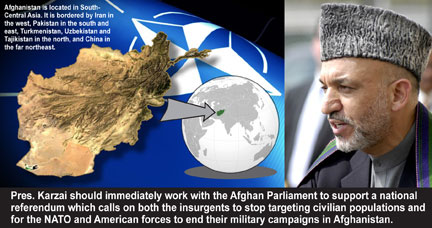Afghan corruption cuts both ways
By Melek Zimmer-Zahine | Last updated: Nov 30, 2009 - 10:11:30 PMWhat's your opinion on this article?
KABUL (IPS/GIN) - Afghan President Hamid Karzai and Barack Obama, his U.S. counterpart, missed a chance to reset the critical relationship between their two countries and move the dialogue forward in an honest direction.

|
—NEWS ANALYSIS—
Hours after Mr. Karzai was declared the winner in the long-drawn presidential elections, President Obama made a congratulatory call and also a request that the Afghan president move boldly to fight the corruption and drug trade that is holding Afghanistan back, fueling the insurgency and leaving the U.S. and its European allies with a weakened partner.
Specifically, the Obama administration and European capitals are looking for Mr. Karzai to establish an anti-corruption commission. They also want Mr. Karzai to remove a number of high profile individuals from positions of power.
One of these is Mr. Karzai's vice presidential running mate, Mohamad Qasim Fahim, a suspected drug trafficker. Another is General Rashid Dostum who has been accused by various independent human rights organizations in the killings of thousands of Taliban prisoners. Even Mr. Karzai's brother, Ahmed Wali Karzai, who has come under Western criticism for his suspected role in Afghanistan's drug trade.
At a press conference after the Obama call, Mr. Karzai said that instead of removing individuals from positions of power, a review and change of Afghan law is in order—maintaining status quo.
Indeed, there's a lot that's wrong in Afghanistan and in the way its president has lead the country since 2002. But the United States, its NATO allies and respective donor agencies have also contributed significantly to the corruption and human rights abuses here.
To now condemn Mr. Karzai for having individuals such as his brother and Mr. Dostum in positions of power, when the U.S. and its partners empowered these people in their fight against al-Qaeda and the Taliban is highly disingenuous.
Why should Mr. Karzai—let alone the Afghan people—take Mr. Obama's request for an anti-corruption commission seriously when the United States and its partners have mismanaged and wasted hundreds of millions of dollars on over- priced, ill-planned reconstruction projects?
And speaking of commissions, the coalition has yet to establish an official commission to review their near trillion dollar war, to say nothing of mismanaged, corruption riddled development projects since that war began.
In the few days since the confirmation of his second term, President Karzai has also missed an opportunity to foster an honest and fresh direction for his people and their global partners, many of whom it must be noted, are sacrificing their lives on Afghan soil everyday.
Now the challenge is for both Mr. Obama, Mr. Karzai and the international community to get beyond the rhetoric and easy headlines and demand honesty of themselves and from each other.
President Karzai, however awkwardly, has been given a mandate to lead Afghanistan for a second term. At this moment, neither he–nor those he leads—have the power to demand greater accountability from their international partners. But Mr. Karzai does have the power to demand greater accountability of himself and his people.
There are a number of steps President Karzai can take in the precious days and weeks ahead to prove, first and foremost to the Afghan nation and second to the insurgent leaders holding the nation hostage, that he is not acting on the pressure of foreigners to change but rather from his own desire and consciousness for a more just, decent and dignified nation.
This will mean having the courage to enact a series of bold measures, starting with the establishment of a truth commission to investigate and prosecute perpetrators of war crimes, even those who have received immunity by the Afghan Parliament. This should include official recognition for the victims of these crimes.
High profile drug traffickers should also be captured and prosecuted and as part of this initiative, alternative livelihood programs should be launched, to give poppy farmers a sustainable solution to the country's drug economy.
In order to advance the fight against al-Qaeda and Taliban groups, President Karzai should immediately work with the Afghan Parliament to support a national referendum which calls on both the insurgents to stop targeting civilian populations and for the NATO and American forces to end their military campaigns in Afghanistan. It is these campaigns which are fueling the insurgency not the other way around.
The U.S. and NATO in turn must take a long, hard look in the mirror. If they do, they will see that they in fact created much of the mess they are now demanding that Mr. Karzai clean up. The same anti-corruption commission which they demand of Mr. Karzai, they should also be demanding of themselves. This will send a strong signal to their constituents and the Afghan people that they are genuine about getting it right in Afghanistan.
(Melek Zimmer-Zahine is a founding member of The Killid Group. IPS and Killid, an independent Afghan media group, are partners since 2004.)
INSIDE STORIES AND REVIEWS
-
-
About Harriett ... and the Negro Hollywood Road Show
By Rabiah Muhammad, Guest Columnist » Full Story -
Skepticism greets Jay-Z, NFL talk of inspiring change
By Bryan 18X Crawford and Richard B. Muhammad The Final Call Newspaper @TheFinalCall » Full Story -
The painful problem of Black girls and suicide
By Charlene Muhammad -National Correspondent- » Full Story -
Exploitation of Innocence - Report: Perceptions, policies hurting Black girls
By Charlene Muhammad -National Correspondent- » Full Story -
Big Ballin: Big ideas fuel a father’s Big Baller Brand and brash business sense
By Bryan Crawford -Contributing Writer- » Full Story






 Click Here Stay Connected!
Click Here Stay Connected!








